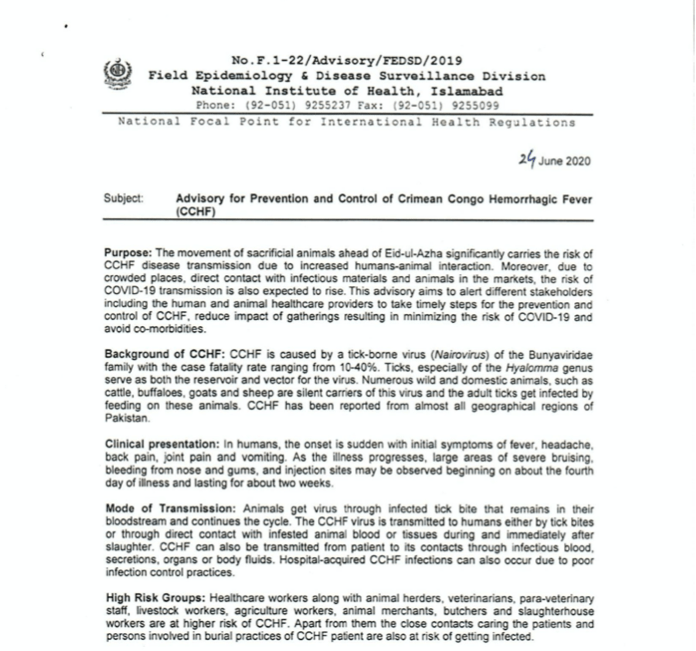Pakistan’s National Institute of Health has expressed concerns over the increased risks of transmission of the Wuhan Coronavirus and another deadly disease named Crimean-Congo Hemorrhagic Fever (CCHF) due to increased human-animal interaction during the upcoming Eid al Adha or Bakra Eid. It has stated that the increased human-animal interaction during movement, purchase and herding of sacrificial animals ahead of Eid multiplies the risks of the CCHF. Eid al Adha
As per reports, Pakistan’s NIH, through its Field Epidemiology and Disease Surveillance Division (FEDSD), has issued an advisory alerting stakeholders, including healthcare providers to take timely steps to prevent widespread transmission of the above diseases.

The 2-page advisory issued by the NIH states that the deadly disease that is spread by tick bites can be prevented by monitoring sacrificial animals at entry points at markets and making sure that every animal is treated by approved acaricides at least a week before they reach markets. It adds that people participating in slaughtering, butchering and handling tissues and skin should wear appropriate protective gear like gloves etc, even while doing it at home.
The NIH advisory further states that livestocks should always be examined for ticks and animal herders and sellers should take adequate precautions while examining and treating ticks on the body of animals. It added that ticks should never be crushed with fingers. It also called for proper handling, herding and burial practices.
The advisory stated that people visiting animal markets during Eid should wear full sleeves clothes, gloves and face masks. It advocated for the usage of insect repellents to avoid ticks, examining clothes and body for ticks and usage of proper hand wash and sanitisation techniques.

What is CCHF?
Crimean-Congo Hemorrhagic Fever is a deadly and infectious disease caused by a tick-borne Nairovirus of the Bunyaviridae family. The fatality rate of the disease is at a risky 10-40% and in severe outbreaks, can even go up to 90%. Ticks present on the body of domestic animals like cattle, sheep, buffalo and goats serve as both the reservoir and vector of the virus. WHO says that the virus can spread quickly and can cause dangerous hospital and health facility outbreaks. It also says that the disease is very difficult to prevent and treat.
CCHF has symptoms similar to dengue and causes, fever, headache and very low platelet count in humans.
India had also had a CCHF outbreak in 2011
In January 2011, NIV, Pune had confirmed India’s first CCHF outbreak in Gujarat’s Sanand. The patient zero was a woman named Amina Momin of the Kolat village near Sanand town, who had picked it up from ticks on domestic animals. Later, a doctor and a nurse treating her had contracted the disease. All three had died before a viral outbreak was suspected and NIV was contacted by the health authorities.
The NIV had confirmed the virus within 15 hours of getting the samples from Sanand. It had alerted the Gujarat government and the then state government had immediately begun screening of the entire area, covering some 16,000 villages. Due to strict measures and widespread screening, the outbreak was successfully contained. Many subsequent cases have also been reported, especially in the Gujarat region and among communities who herd and slaughter animals.



